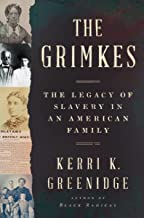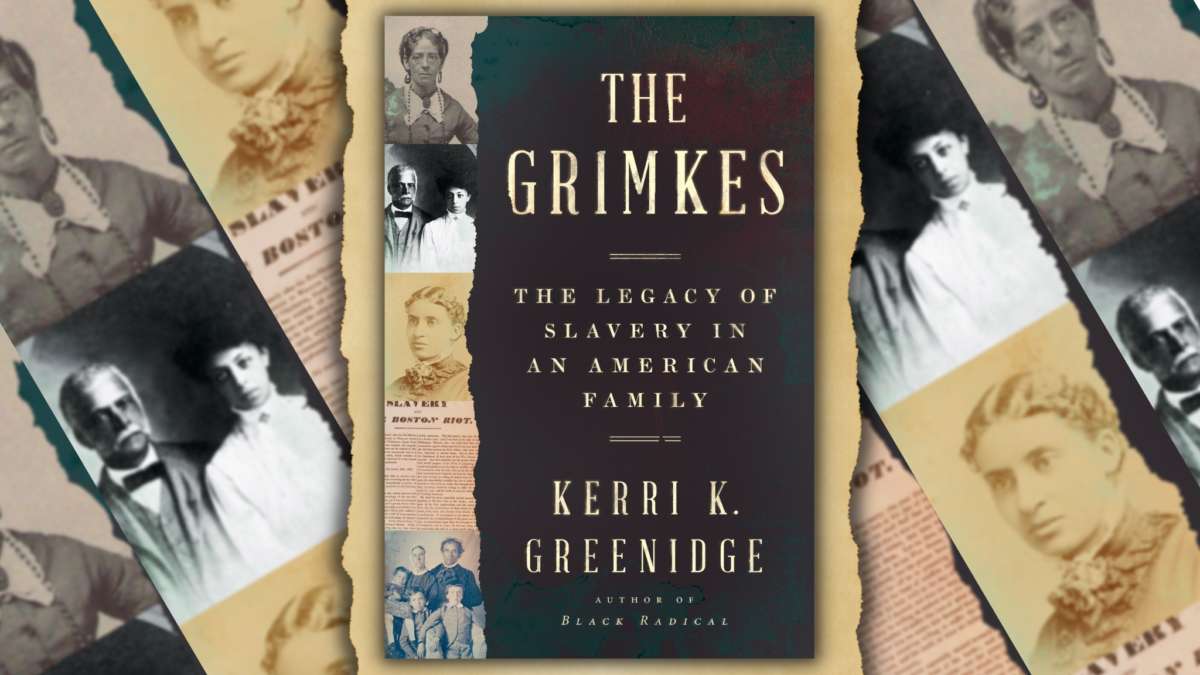The Grimkes, The Legacy of Slavery in an American Family by Kerri K. Greenidge
During the late sixties, women scholars began to urge their male colleagues to carve out a place for “herstory” alongside “history.” Over time, with the establishment of women’s studies departments in colleges and universities, second-wave feminists would correct many longstanding legends of American history. Their research produced transformative knowledge while countless remarkable unsung women were rescued from the past and stood in the spotlight for the first time.
GOES BEYOND CONVENTIONAL NARRATIVES OF ABOLITIONISM
In The Grimkes, The Legacy of Slavery in an American Family (Liveright), Tufts University professor Kerri K. Greenidge has untangled yet another legend. The book arrives 55 years after one of the founders of women’s studies, Gerda Lerner, published a groundbreaking biography of two white South Carolina sisters, Sarah and Angelina Grimke. Lerner placed the Grimkes, antebellum suffragists and abolitionists, in the pantheon of American history.
Greenidge demonstrates their self-righteousness and hypocrisy. It is quite a blow, but the author uses the revelations to tell a fascinating, devastating story that ranges far beyond the conventional narrative of the abolitionist movement.
Sarah (1792-1873) and Angelina (1805-1879) grew up in a slaveholding family in Charleston, S. C., where their father was a state justice and politician. John Faucheraud Grimke and his wife Polly, who owned plantations as well as a house in town, routinely abused their hundreds of slaves.
To say they were physically and verbally cruel and brutal doesn’t begin to describe the violence of their words and actions. Their children, at least seven siblings, grew up watching the horror.
Sarah and Angelina were sympathetic, albeit passive, but their brothers Henry and Charles imitated their parents with ferocity. Through continual beatings and pranks, these two destroyed the life of a young slave named Stephen, who would be passed around the disinterested family as he declined prematurely.
REVEALS A BLACK GRIMKE DESCENDANT
Greenridge’s story opens in the 20th century where a Black poet and playwright, Angelina “Nana” Weld Grimke (1880-1958), has just survived a train wreck on her way from Washington, D.C. to Boston. How could a Black woman possibly be a Grimke?
This Angelina, it turns out, is the granddaughter of the aforementioned monster Henry Grimke. Her grandmother, Nancy Weston, was a slave with whom Henry started a relationship in 1843 after his wife died and he needed a nurse to take care of his children.
Elegant and impassive in a photograph taken in 1885, twenty years after the end of the Civil War, Nancy almost certainly had no choice in sleeping with her master.
Occasionally, relationships between female slaves and male slaveowners benefited the slave and her children. That was decidedly not the case with Nancy Weston and Henry Grimke.
While he cared for her in sickness and promised manumission and support, Henry’s 1852 death left Nancy scrambling for money and a place to live. Most terribly, she and her three young sons with Henry — Archibald, Francis, and John Grimke — now lay at the mercy of his equally vicious brother, Charles, and Henry’s oldest son, Montague (from his marriage to a white woman).
Kerri Greenidge’s descriptions of the torture and humiliation endured by Archie, Frank, and John surpass comprehension. Escaping the wrath of Charles, they fled their mother’s ramshackle home and hid in chimneys and privies, only to be caught by Montague, thrashed to a pulp in the middle of the street and sent to a notorious workhouse where slaves were starved, hung, whipped, and chained.
It is extraordinary that Nancy’s three sons were able to leave Charleston and head north. They were already students at Lincoln University — the nation’s first degree-granting HBCU about 50 miles west of Philadelphia — when Angelina and Sarah “discovered” the existence of their nephews.
FEMALE ABOLITIONISTS LEAD THE MOVEMENT
Since the mid-1830s, Sarah and Angelina had been members of the Philadelphia Female Anti-Slavery Society, fervent abolitionists influenced by Quakerism. The interracial Society drew the city’s smartest, and some of its wealthiest Black women. They and their white counterparts also supported the American Anti-Slavery Society.
They worked together amicably, but eventually Black women abolitionists wished to be “autonomous architects of Black freedom,” Greenidge writes. Further, they were angry that white women abolitionists denied the importance of suffrage for Black women.
Piety underlay the convictions of Sarah Grimke and many white women abolitionists. Some advocated an incremental approach to emancipation while others could not grasp that enslavement was a legacy of exploitation and suffering. All in all, they lacked what Greenidge calls “transcendent humanitarianism,” the will to understand the poison of slavery on a fundamental level.
Sarah and Angelina had died by the nation’s centennial in 1876, but their nephews Archie and Frank lived well into the twentieth century. Peripatetic, quirky, and class-conscious, the brothers flourished as part of the “colored aristocracy” that developed during the Gilded Age. The Grimke name served them well — no thanks to Sarah and Angelina — and haunted them, too.
Their Blackness was, Greenidge shows, “a peculiar currency.” Unsurprisingly, the brothers buried the past almost until the very end.
WELL-RESEARCHED DIVE INTO SLAVERY
Kerri Greenidge’s meticulously researched history of the Grimke family is packed with “unwelcome truths,” in the words of the author. The Grimkes goes down to the bone, peeling back layers of misery, tragedy, and rage. Ultimately, the reader realizes that every person in this wide-ranging study has been defiled by slavery in a particular way.
“We have so few options,” Henry Grimke’s granddaughter Angelina told a friend. “The most we can be is ourselves and craft the world that we wish to see.” Greenidge’s beautifully crafted book portrays a world that we, too, must urgently see in order to begin to understand the divisive times in which we live.
About Kerri K. Greenidge:
Greenidge is the Mellon Assistant Professor in the Department of Studies in Race, Colonialism, and Diaspora at Tufts University. She is the author of Black Radical: The Life and Times of William Monroe Trotter. Listed by the New York Times as one of its top picks of 2019, the book is the first biography of Boston editor, William Monroe Trotter, written in nearly 50 years.
The book received the Mark Lynton Prize in History, the Massachusetts Book Award, the J. Anthony Lukas Award, the Sperber Award from Fordham University, and the Peter J. Gomes Book Prize from the Massachusetts Historical Society. Black Radical was also short-listed for the Stone Book Award from the Museum of African American History, Boston, the Cundill History Prize and the Plutarch Award for Best biography.
Greenidge received her doctorate in American Studies from Boston University. Her writings have appeared in the Massachusetts Historical Review, the Radical History Review, the New Yorker, the Atlantic and the Guardian. At Tufts University, she also co-directs the African American Trail Project.





